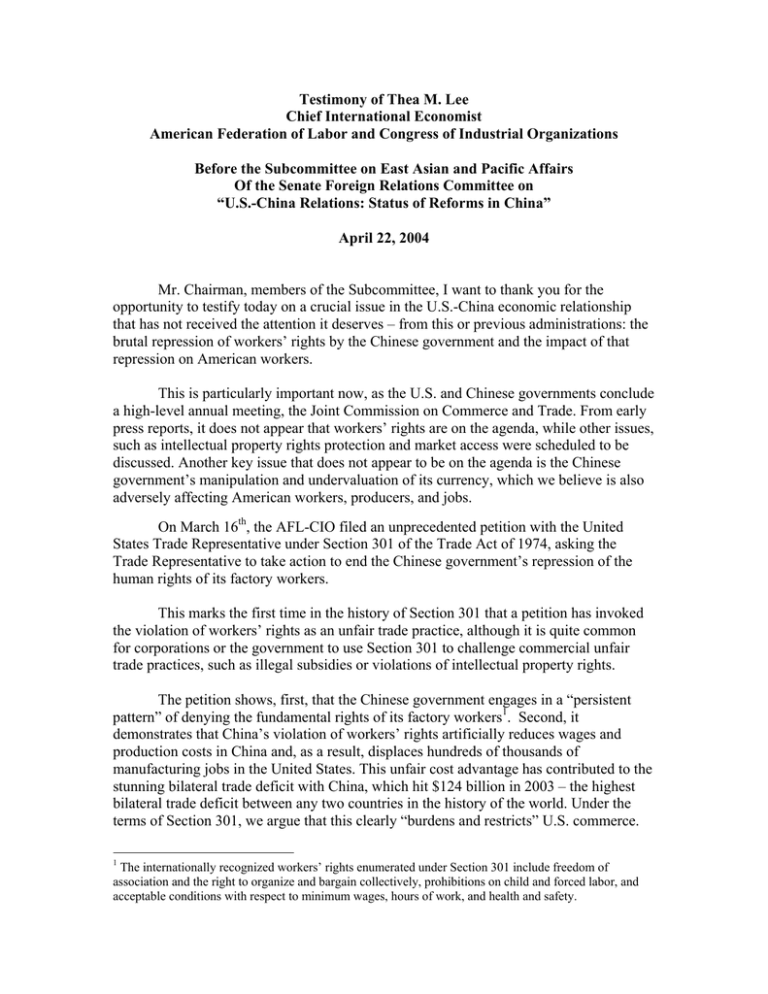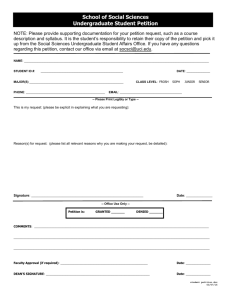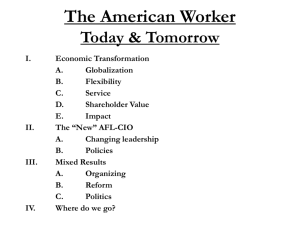Testimony of Thea M. Lee Chief International Economist
advertisement

Testimony of Thea M. Lee Chief International Economist American Federation of Labor and Congress of Industrial Organizations Before the Subcommittee on East Asian and Pacific Affairs Of the Senate Foreign Relations Committee on “U.S.-China Relations: Status of Reforms in China” April 22, 2004 Mr. Chairman, members of the Subcommittee, I want to thank you for the opportunity to testify today on a crucial issue in the U.S.-China economic relationship that has not received the attention it deserves – from this or previous administrations: the brutal repression of workers’ rights by the Chinese government and the impact of that repression on American workers. This is particularly important now, as the U.S. and Chinese governments conclude a high-level annual meeting, the Joint Commission on Commerce and Trade. From early press reports, it does not appear that workers’ rights are on the agenda, while other issues, such as intellectual property rights protection and market access were scheduled to be discussed. Another key issue that does not appear to be on the agenda is the Chinese government’s manipulation and undervaluation of its currency, which we believe is also adversely affecting American workers, producers, and jobs. On March 16th, the AFL-CIO filed an unprecedented petition with the United States Trade Representative under Section 301 of the Trade Act of 1974, asking the Trade Representative to take action to end the Chinese government’s repression of the human rights of its factory workers. This marks the first time in the history of Section 301 that a petition has invoked the violation of workers’ rights as an unfair trade practice, although it is quite common for corporations or the government to use Section 301 to challenge commercial unfair trade practices, such as illegal subsidies or violations of intellectual property rights. The petition shows, first, that the Chinese government engages in a “persistent pattern” of denying the fundamental rights of its factory workers1. Second, it demonstrates that China’s violation of workers’ rights artificially reduces wages and production costs in China and, as a result, displaces hundreds of thousands of manufacturing jobs in the United States. This unfair cost advantage has contributed to the stunning bilateral trade deficit with China, which hit $124 billion in 2003 – the highest bilateral trade deficit between any two countries in the history of the world. Under the terms of Section 301, we argue that this clearly “burdens and restricts” U.S. commerce. 1 The internationally recognized workers’ rights enumerated under Section 301 include freedom of association and the right to organize and bargain collectively, prohibitions on child and forced labor, and acceptable conditions with respect to minimum wages, hours of work, and health and safety. China’s brutal repression of workers’ rights is, in our view, the most important issue in the U.S.- China trade relationship. Failure to address the systematic, egregious, and institutionalized repression of workers’ rights in China costs hundreds of thousands of good jobs here, creates conditions of desperation and exploitation in China, and fundamentally alters the nature of global labor competition in the rest of the world. The AFL-CIO’s 301 petition seeks to ensure that our government will give this issue the priority it deserves in its economic dialogue with the Chinese government. China Denies Workers’ Rights There is overwhelming evidence that the Chinese government denies the workers’ rights covered by Section 301. The petition amasses evidence from the U.S. State Department, the International Labor Organization (ILO), labor unions, academics, newspaper accounts, and human rights groups. China denies freedom of association and the right to bargain collectively. The Chinese government relentlessly represses attempts to organize unions that are independent of the government-controlled All-China Federation of Trade Unions (ACFTU). The ACFTU is officially and legally subservient to the Communist Party and to local officials who profit from export enterprises. Workers who attempt to strike or organize unions independent of the ACFTU have been arrested, imprisoned, beaten, and tortured. Even workers who have spoken out against corrupt managers or who have attempted to publicize workplace problems have been subject to severe reprisals and arrest. Conditions of forced labor are widespread. Many of the workers in China’s export sector are temporary migrants from the countryside, who work under a system of internal passports that is similar to the pass system in apartheid-era South Africa. Factory workers are permanently registered to live in their rural villages, and have few civil or political rights when they work temporarily in factory towns and cities. Upon arrival to the factories, migrant workers become heavily indebted in order to pay large “deposits” and other fees to their employers. They lose their deposit if they quit without the employer’s consent. They are thereby essentially turned into bonded laborers who cannot leave their employment without incurring large and disproportionate penalties. The wages, conditions of work, and hours often turn out to be quite inferior to what is promised upon arrival, meaning that workers have clearly not entered into a free labor market, with fairly enforced rules. China does not enforce its own laws with respect to minimum wages, maximum hours, and workplace safety and health. Many manufacturers in China, including multinational corporations, pay their workers much less than the minimum wage standards set by the central and provincial governments. It is apparently common for companies to keep double and triple sets of books, to hide this practice. Workplace safety and health practices are atrocious, and China has the highest rate of industrial deaths and accidents in the world. Government officials simply do not enforce their own laws on wages, hours, and safety and health. The AFL-CIO’s petition does not challenge China’s right to compete in the global economy on the basis of low wages. It is natural for a developing country with an excess supply of poorly educated rural workers to have low wages. We fully understand that even if China fully enforced its workers’ rights, the wage gap between Chinese and American workers would not disappear. But it would surely narrow. The AFL-CIO challenge is specifically to the incremental cost advantage that comes from the brutal and undemocratic repression of workers’ human rights. That increment is an illegitimate advantage under universal norms of human rights. And it is illegitimate under U.S. trade law as well. The Burden on U.S. Commerce U.S. workers today have to compete with factory workers who are forced to work under lawless working conditions. And it is taking a toll. The manufacturing sector in the U.S. has been losing jobs for 43 straight months. The U.S. has lost a staggering 2.8 million manufacturing jobs since early 2001. The AFL-CIO petition shows that China’s violations of workers’ rights gives Chinese manufacturers a cost advantage ranging between 10 percent and 77 percent of overall production costs. We estimate that the illegitimate cost advantage displaces approximately 727,000 jobs in the United States. These are very conservative estimates. We used the most conservative assumptions to estimate the wage reduction that results from the Chinese government’s repression of independent unions and its failure to enforce its own minimum wage laws. Then we applied the trade model used by the U.S. International Trade Commission to translate that figure into an impact on U.S. output, prices, and jobs. And the burden on U.S. workers goes far beyond the number of jobs lost. Twenty-five percent of displaced workers in the U.S. are still without a job six months after losing their jobs. Many of those who are fortunate enough to find new jobs suffer big losses of income, with two-thirds earning less on their new jobs. And these figures on lost wages are from the years before the bottom fell out of the labor market in the last three years, when it has become even more difficult to transition into decent-paying jobs. China’s Manufacturing Capacity While U.S. manufacturing workers have faced catastrophic losses, China’s manufacturing output, exports, and productive capacity have grown at unprecedented, accelerating rates – and are poised to grow even more explosively in the next five years. It is much easier to keep jobs from leaving than it is to bring them back once they are gone. For this reason, the USTR should act now to prevent the imminent, irreversible loss of U.S. jobs due to China’s illegitimate exploitation of its factory workers. Even though China is still in a relatively early stage of industrialization, it is already the second leading exporter to the United States, surpassed only by Canada. China’s exports to the United States now exceed the exports of such industrial powerhouses as Japan, Germany, and the United Kingdom, and may soon surpass even Canada’s. China’s exports to the United States also exceed those of Mexico, the lowwage export platform immediately across our border. Unlike Mexico and other emerging export platforms, China has made “the crucial leap” from assembly of electronic and other consumer goods for global and domestic markets, to manufacturing the components for those goods, including the fabrication of computer chips. Guangdong Province encompasses the largest such production base for electronics in the world. China now leads the world in the production of televisions, refrigerators, cameras, bicycles, motorbikes, desktop computers, computer cables and other components, microwave ovens, DVD players, cell phones, cigarette lighters, cotton textiles, and countless other manufactured products – and China’s lead is growing at an accelerating pace. China’s exports of textile and apparel goods have increased 320 percent in the last two years, while U.S. employment in those sectors has fallen by 323,000. In the first eleven months of 2003, China’s production of computers grew by 105.5%. Its production of micro-computers grew by 84.9%, power-generating equipment by 72.5%, optical communication equipment by 54.3%, air conditioners by 43.2%, semiconductor integrated circuits by 38.6%, metal-cutting machine tools by 34.1%, motor vehicles by 33%, chemical equipment by 30.5%, fax machines by 30.2%, household refrigerators by 27.3%, household washing machines by 27%, cell phones by 24.5%, electric motors by 26.8% electric-driven tools by 26.2%, steel products by 21.5%, and plastic products by 17%. China’s output of many manufactured products showed accelerating growth in the later months of 2003.China has now become an export powerhouse in high-tech computers and electronics and machine parts, not just low-tech toys and garments. But even while productivity rose rapidly in China in the last decade, the real wages of China’s factory workers stagnated. The manufacturing boom in China has not been a train carrying China’s workers into the middle class. China’s workers can’t bargain for higher wages because they lack basic workers’ rights. The U.S. Must Act The President had 45 days from the date when the AFL-CIO filed its petition, March 16th, to decide whether to accept the petition and launch an investigation. If he denies the petition, he must state his reasons. He must declare either that China does not violate its workers’ rights, or that China’s violation of its workers’ rights has no adverse effect on U.S. workers. Either declaration would contradict the overwhelming evidence presented in the AFL-CIO petition. Indeed, the President had authority under Section 301 to take action on his own initiative even without the AFL-CIO petition, but he has chosen not to do so. The only Section 301 case initiated by this Administration to date has been on intellectual property rights violations in the Ukraine. Section 301 authorizes the President to take any actions within his Constitutional powers to enforce fair competition and protect workers’ rights overseas. The AFL-CIO petition asks that the President take three actions to remedy China’s persistent denial of workers’ rights: First, the President should impose trade measures against China that are sufficiently large to induce China to enforce workers’ rights and to offset the unfair competition caused by China’s violations. The AFL-CIO is not asking for protectionist barriers. If China enforces the basic workers’ rights agreed by the international community, then it can enjoy normal access to U.S. markets, and it can create jobs that don’t assault human dignity. Second, in that non-protectionist spirit, the AFL-CIO asks that the President negotiate an agreement with China to phase out the trade measures in incremental steps, as China comes into compliance with concrete workers’ rights benchmarks – benchmarks that are specific and verifiable by the ILO, the United Nations agency responsible for promulgating and monitoring international labor rights. Third, the AFL-CIO asks that the President enter into no new WTO agreements until the WTO incorporates enforceable core workers’ rights as a condition of WTO membership. It is essential that workers’ rights be protected throughout the trading system, ideally through multilateral rules. Global rules should fairly enforce basic workers’ rights – to ensure that global competition does not reward and encourage repression of fundamental human rights at the workplace. I thank you for your attention, and I look forward to your questions.




